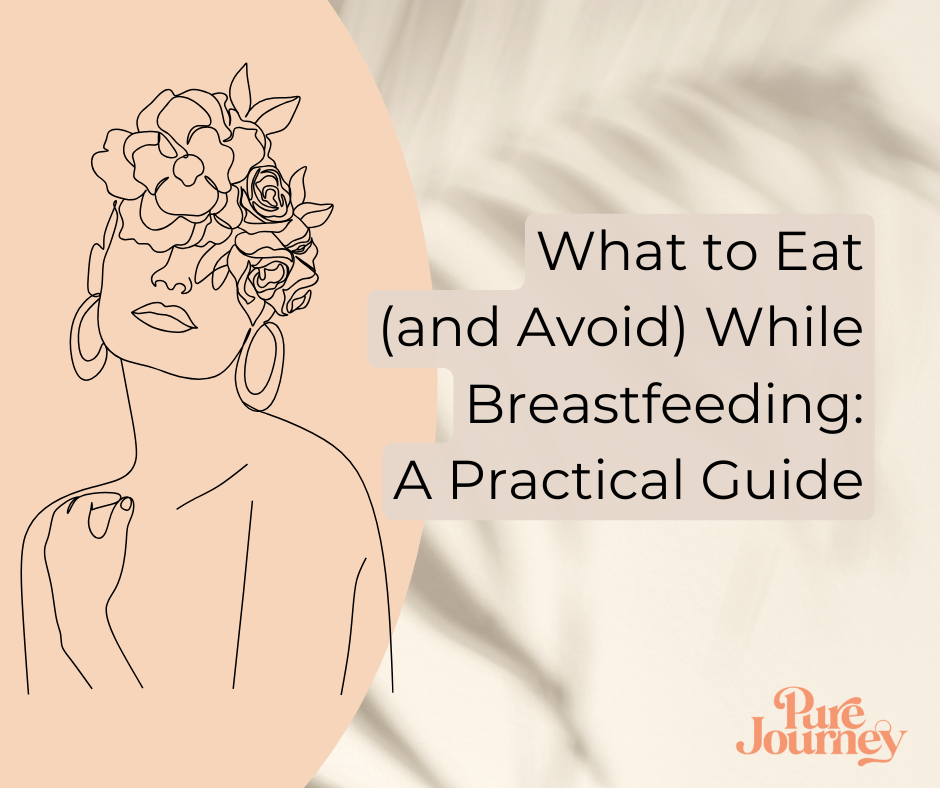
Breastfeeding is an incredible way to nourish your baby while also supporting your own postpartum recovery. But as a new mom, you might be wondering: What are the best foods to eat while breastfeeding? Are there any foods I should avoid? How can my diet impact my milk supply and my baby’s digestion?
In this practical guide to breastfeeding nutrition, we’ll cover the best foods for breastfeeding moms, essential nutrients for milk production, and what foods to avoid while nursing to keep both you and your baby happy and healthy.
Why Nutrition Matters While Breastfeeding
What you eat while breastfeeding affects:
✔ Your milk supply – Certain foods and nutrients can help maintain or boost breast milk production.
✔ Your baby’s health – Your baby gets essential vitamins, minerals, and even flavours from your diet.
✔ Your energy levels – Caring for a newborn requires extra calories and nutrients to prevent exhaustion.
✔ Your postpartum recovery – Nutrient-dense foods help heal your body after childbirth.
Eating the right foods while breastfeeding ensures that you are nourishing both yourself and your baby with the best possible nutrition.
The Best Foods to Eat While Breastfeeding
1. Protein-Packed Foods for Milk Production
Protein is essential for milk production, muscle repair, and postpartum recovery. The best high-protein breastfeeding foods include:
- Eggs – A great source of choline, which is crucial for baby’s brain development.
- Lean meats (chicken, turkey, grass-fed beef) – Provide high-quality protein and iron.
- Fish rich in omega-3s (salmon, sardines, mackerel) – Support baby’s brain health.
- Dairy products (yogurt, cheese, milk) – Offer calcium and probiotics for gut health.
- Plant-based proteins (lentils, beans, chickpeas, tofu, quinoa) – Great for vegetarian and vegan moms.
2. Healthy Fats for Baby’s Brain Development
Healthy fats are crucial for baby’s brain and nervous system development and help keep you feeling full. Add these to your breastfeeding diet:
- Avocados – Loaded with good fats and fibre for sustained energy.
- Olive oil – A healthy fat that supports heart and brain function.
- Nuts and seeds (almonds, walnuts, flaxseeds, chia seeds) – Provide omega-3s and vitamin E.
- Fatty fish – Salmon and sardines contain DHA, an essential fatty acid for cognitive development.
3. Complex Carbohydrates for Energy
New moms need slow-digesting carbs for steady energy levels. The best complex carbs for breastfeeding include:
- Oats – A popular galactagogue (milk-boosting food) rich in fibre.
- Sweet potatoes – Packed with vitamin A, essential for baby’s growth.
- Brown rice and quinoa – Whole grains that provide B vitamins for energy.
- Fruits (bananas, apples, berries, oranges) – Full of antioxidants and natural sugars.
4. Iron-Rich Foods to Prevent Fatigue
Iron helps prevent postpartum anaemia, which can lead to low energy and decreased milk supply. Eat:
- Spinach, kale, and other leafy greens – Rich in iron and vitamin C.
- Lean beef and liver – Some of the best sources of easily absorbable iron.
- Pumpkin seeds and legumes – Great plant-based iron sources.
5. Hydration is Key!
Breastfeeding moms need extra fluids to maintain milk production. Drink:
- Water – Aim for 8-10 glasses per day.
- Herbal teas – Chamomile and fennel tea can help with digestion and relaxation.
- Coconut water – A natural electrolyte-rich drink to prevent dehydration.
- Bone broth – Packed with minerals and collagen for postpartum healing.
Foods to Avoid While Breastfeeding
While most foods are safe for nursing moms, some can cause gas, colic, or allergic reactions in babies. If you notice fussiness or digestive discomfort in your baby, try avoiding these foods:
1. High-Mercury Fish
❌ Tuna, swordfish, king mackerel, and shark – These fish contain high levels of mercury, which can harm baby’s nervous system.
2. Caffeine in Large Amounts
❌ Coffee, tea, energy drinks, and soda – Too much caffeine can make babies fussy and disrupt sleep. Stick to one or two cups a day.
3. Alcohol
❌ Wine, beer, and liquor – Alcohol passes into breast milk and can affect baby’s development. If you do drink, wait at least 2 hours per drink before nursing.
4. Spicy and Gas-Producing Foods
❌ Garlic, onions, spicy peppers, cabbage, broccoli, beans – These can cause gas and colic in sensitive babies.
5. Dairy (If Baby Shows Sensitivity)
❌ Some babies are sensitive to cow’s milk protein, leading to colic, eczema, or reflux. If you notice symptoms, try eliminating dairy for 2 weeks and see if symptoms improve.
Tips for a Healthy Breastfeeding Diet
💡 Eat nutrient-dense meals – Focus on whole foods over processed snacks.
💡 Snack smart – Keep nuts, yogurt, and fruit on hand for quick energy.
💡 Plan ahead – Meal prep to avoid reaching for unhealthy options.
💡 Listen to your body – Hunger and thirst increase while breastfeeding. Eat when hungry and drink when thirsty.
💡 Include galactagogues – Foods like oats, fennel, and fenugreek may help increase milk supply.
Final Thoughts: Nourish Yourself, Nourish Your Baby
Eating a balanced breastfeeding diet supports your recovery, milk supply, and your baby’s development. By choosing nutrient-rich, whole foods, staying hydrated, and avoiding potential irritants, you’ll feel energized and confident in your postpartum journey.
Looking for Natural Supplements for Breastfeeding Moms?
At Pure Journey, we offer science-backed, natural supplements designed to support milk supply, postpartum recovery, and maternal health. Explore our range of clean, nutrient-rich formulas today!

